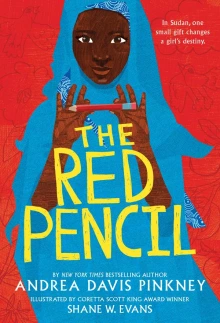
The Red Pencil
Written by Andrea Davis Pinkney
Illustrated by Shane W. Evans
Little Brown, 2014, 308 pp.
ISBN-13: 978-0-316-24780-1
Amira, at age 12, has finally become old enough to wear a toob (5-6 meter cloth wrapped around the entire body) and be treated as more than a child. Her home with her father, mother and little sister in Southern Darfur is full of love and happiness, except for one thing: Amira loves to draw in the sand and wants to learn how to draw letters so that she can read books that will help her family grow better crops. She bumps up against the belief of her mother that girls do not need that skill to get married and have children. In spite of Amira's disappointment, life is peaceful--until a militant group called Janjaweed raids the village and kills her father.
Amira is forced to flee with her remaining family and a neighbor, Old Anwar, walking night after night to the Kalma refugee camp near the city of Nyala. In spite of all the challenges of life in a refugee camp—-and there are many-—Amira continues to draw and dream of an education. Old Anwar begins to secretly teach her the letters of the English alphabet. One day she receives the gift of a red pencil and a pad of paper from a humanitarian worker. To draw and communicate on paper is wonderful—-so wonderful that Amira decides that an education is worth the danger of running away from her family to the city. The story concludes as Old Anwar and Amira begin the journey toward a school in Nyala that welcomes girls.
Told in lyrical prose, the book describes in careful detail not only the real-life challenges of living in Darfur in 2003-2004, but the joys as well. Amira’s life before the raid acts as a strong counter-narrative to the images that portray Darfur as a destitute country racked with drought, hunger and civil war. While those realities are a big part of Amira’s story, the book also includes lyrical descriptions of the strength of family and community, which give Amira the resilience to keep working and hoping through the emotional pain of her loss. Ultimately, Pinkney creates a balanced character who struggles but is energized by her dreams. While the media only portrays hopelessness in their reports on Darfur, Amira’s physical and emotional journey is a story that disrupts those media reports by exuding possibilities for Amira and young people like her. There is one detail, however, that could have used more explanation. Why does Old Anwar begin to teach Amira the English alphabet? Obviously, he is a wise learned villager who knows and loves the Qur’an, but where he learned English and why he instructs in English remains unanswered throughout the story. The official language in schools is primarily Arabic.
If interested in pairing this book with others about young people facing struggles rooted in political or social conflict, readers are encouraged to read Golden Boy by Tara Sullivan (2014) or Never Fall Down by Patricia McCormick (2013).
Andrea Davis Pinkney lives in New York with her family. Years ago, when she complained to her husband, illustrator Brian Pinkney, about the lack of diversity in children’s books, he challenged her to write the stories herself. Since then she has contributed over 30 titles, many award-winning, that tell the stories of Africans and African Americans. In the Author’s Note, Pinkney describes her careful research process but is quick to state that she is not an expert on Darfur. However, she was passionate about getting the facts straight and made several trips to Africa, and conducted hours of interviews with Sudanese refugees and humanitarian workers. She convincingly describes Amira’s conflicting feelings and the cultural dissonance of the refugee camp.
Illustrator Shane W. Evans renovated a space in Kansas City, Missouri called “Dream Studio” in which he supports his own artistry and that of his community. He has also been involved in projects in Uganda, Mali, and Lesotho. His signature lined style fits well with Amira’s story as she begins to draw with a twig in the sand, and continues her literary journey with pencil and paper.
Susan Corapi, Trinity International University, Deerfield, IL
WOW Review, Volume IX, Issue 2 by Worlds of Words is licensed under a Creative Commons Attribution-NonCommercial-ShareAlike 4.0 International License. Based on work at https://wowlit.org/on-line-publications/review/volume-ix-issue-2.










